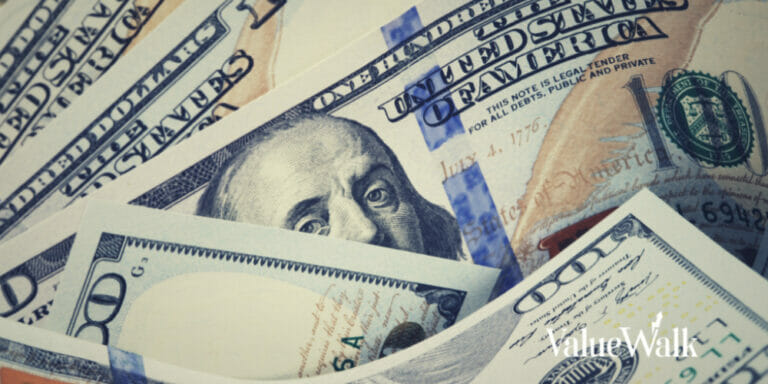US Race For Digital Dollar Fuels Case For Bitcoin

With the US government’s work on a potential digital dollar accelerating, meaning a digital dollar could soon become a reality in the US, the case for Bitcoin is “significantly stronger.”
This assessment by Nigel Green, CEO and founder of the deVere Group, one of the world’s largest independent financial advisory, asset management and fintech organizations, comes as Nellie Liang, the US Treasury’s undersecretary for domestic finance, noted that the federal government will start meetings. in the “coming months” on a central bank digital currency (CBDC).
Q4 2022 hedge fund letters, conferences and more
Gates Capital Management is reducing risk after rare down years [Exclusive]
Gates Capital Management’s ECF Value Funds have a stellar track record. The funds (full name Excess Cash Flow Value Funds), which invest in an event-driven equity and credit strategy, have produced an annual return of 12.6% over the past 26 years. The funds gained a total of 7.7% in the second half of 2022, surpassing the 3.4% return for Read more
Digital Dollar may soon become a reality
Last week in a speech to the Atlantic Council, Liang said US officials are “actively evaluating whether a CBDC is in the national interest,” and highlighted some of the potential benefits of a Federal Reserve-backed digital currency, noting it “could help to preserve the global role of the dollar” and possibly reduce frictions in cross-border transactions.
Nigel Green observes: “This is the clearest sign yet that a digital US dollar could soon become a reality, pending congressional approval.
“With the world’s largest economy now stepping up its efforts, the global race for CBDCs is now intensifying.
“It is estimated that more than 80% of central banks around the world are considering launching a digital central bank currency or have already done so. It seems that the US is now determined not to be left behind and is speeding up the project.
“It appears to have become a critical issue for global leadership, as China is the most economically powerful country leading CBDC implementation.”
Proponents of CBDC say digital payments can be processed faster than traditional cash or check payments, reducing transaction times and increasing the speed of trade.
In addition, transaction costs can be cheaper to process than traditional cash or check payments, potentially reducing costs for businesses and consumers. A digital system will be able to provide greater access to financial services for people who may not have access to traditional banking services.
“While CBDCs may have many advantages, including convenience, efficiency and transparency, what they lack is privacy,” says Nigel Green.
“In effect, the digital dollar is Big Brother-style surveillance technology.
“These state-backed, programmable digital currencies will give governments greater real-time monitoring of citizens’ transactions, potentially leading to the collection of sensitive personal information.
“This can include information about individuals’ spending habits, income and other financial activities. This has raised concerns about the potential for public misuse of this information, such as the use of financial data to monitor and control individuals’ behaviour.
“It’s an extra lever of control that they’ve never had before.”
This, says the CEO of the deVere Group, is why Bitcoin and cryptocurrencies will become increasingly attractive.
“Why? Because they still have all the benefits of being digital – speed, efficiency and convenience – but they’re fundamentally different as they run on an open, immutable blockchain.
“They are global, decentralized – with no authority able to control – borderless, tamper proof and censorship resistant.”
Despite the fact that the US Treasury seems to be preparing the launch of a digital dollar, there are a growing number of voices in opposition.
Representative Tom Emmer has introduced legislation in the House of Representatives that could restrict the Federal Reserve from issuing a central bank digital currency, or CBDC.
Last month, Emmer confirmed that he had introduced the “CBDC Anti-Surveillance State Act” to protect Americans’ right to financial privacy.
According to the lawmaker, the bill would prevent the Fed from issuing a digital dollar “directly to anyone,” prevent the central bank from implementing monetary policy based on a CBDC, and require transparency of initiatives related to a digital dollar.
“Any digital version of the dollar must uphold our American values of privacy, individual sovereignty and free market competition,” he said. “Anything less opens the door to the development of a dangerous surveillance tool.”
Nigel Green concludes: “The US’s entry into the CBDC race underscores more fully that digital is inevitably the future of money .
“It is increasingly clear that in the not too distant future we will have a multi-faceted system of currencies, including fiat, CBDCs and crypto.
“While there are pros and cons to all, for many people programmable, trackable CBDCs will be unattractive due to privacy concerns and government surveillance.
“What is urgently needed is sensible, informed public conversation.”
About deVere Group
The deVere Group is one of the world’s largest independent advisers for specialist global financial solutions to international, local, affluent and affluent clients. It has a network of more than 70 offices worldwide, over 80,000 clients and $12 billion under advisement.



